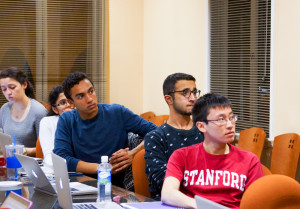
In a long discussion on Tuesday evening, the 15th ASSU Undergraduate Senate debated how to best adjust the monetary amount it had initially recommended be allocated to special fees groups.
Groups of senators had met with special fees groups over the weekend to tentatively recommend disbursements to those groups.
“We met with each group for about 20 minutes and mainly checked to see if their budget met the funding requirements set by the ASSU,” Senator Ilya Mouzykantskii ‘16 said. “The philosophy we’ve adopted, mistakenly in my opinion, is that it is up to the students to decide if [each group’s request] is a legitimate [request], and that we are here whether or not the request matches policy.”
The Senate had originally planned to finalize funding requests by their meeting last night. However, after Senate Chair Ben Holston ‘15 was informed by ASSU Assistant Financial Manager Stephen Trusheim ‘13 M.S. ‘14 that the total funds requested by special fees groups had increased by roughly 20 percent over last year, the vote was postponed until the Senate could determine a way to limit the amount requested.
This year’s initial special fees requests totaled $2,610,590. If that amount were to be approved by the student body in April in its entirety, each student’s quarterly activity fee would increase to about $171, up from a current fee of $143, according to the Senate.
“A major flaw in the process was our communication with Stanford Student Enterprises (SSE) [the financial branch of the ASSU]. It’s really hard to anticipate these huge budget increases and the totals requested,” said Senator Angela Zhang ‘16, chair of the appropriations committee.
Proposed strategies to reduce special fees requests included having Holston and Zhang go through the 62 proposals and cut roughly $500,000 from the cumulative total. Mouzykantskii offered a more radical proposal, suggesting that the Senate force every special fees student group to directly petition the student body to be placed on the spring ballot.
Other proposals included cutting a certain percentage from each special fees group’s request or cutting certain special fees line items entirely. For example, Zhang suggested that the Senate limit the amount of money allotted for advertising for events, noting a potential increase in e-flyering.
Ultimately, the senators reached a general consensus that spending reductions would be best attained by calling on student groups to make voluntary cuts. Following that step, Holston and Zhang, with the help of the other senators, would review each request to find places where they could further reduce spending.
“We are going to go to some groups directly that requested a lot of money and see what they can cut. We are then going to get more feedback from senators [about specific requests],” Holston said.
While most special fees groups get on the ballot through a recommendation by the Senate, groups can also get on the ballot by obtaining signatures from 15 percent of the student body, pending approval from the Elections Commission.
Several senators noted that the current situation underscored the need for the Student Activities Fee (SAFE) Reform, which, if approved by the Senate and the student body, would completely overhaul the funding process for student groups and eliminate special fees altogether.
“We’ve talked a lot about how our funding system is unsustainable and how our funding system is going to break. Well, this is what happens when the system breaks,” Holston said. “I want to be clear there are no villains in this situation–but the fact of the matter is that the way our funding system is set up encourages this type of behavior by student groups.”
The Senate also heard an update from Justine Moore ‘16 and Olivia Moore ‘16 about SAFE Reform, and approved $20,276.52 in general fees funding.
Contact Andrew Vogeley at avogeley ‘at’ stanford ‘dot’ edu.